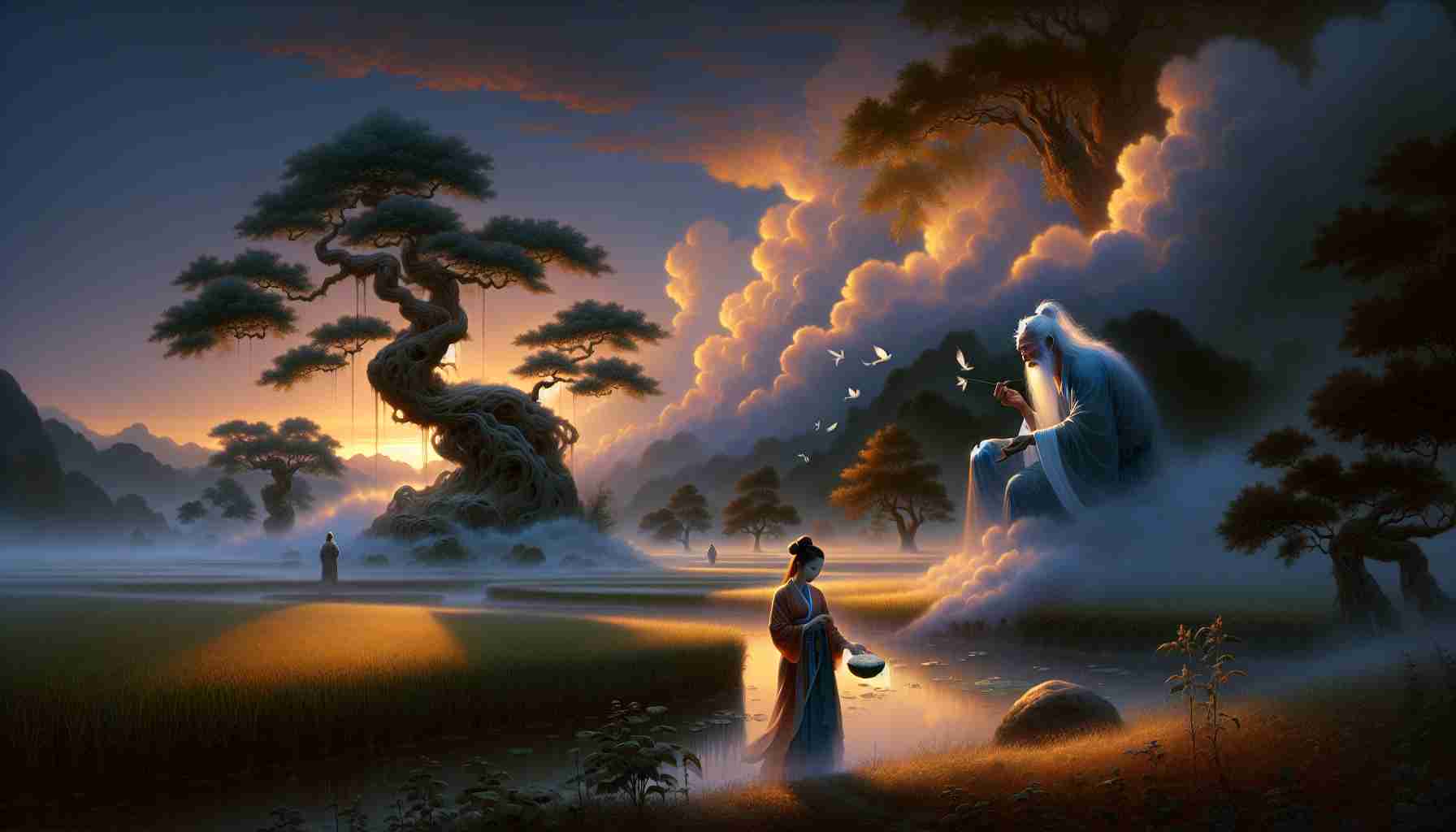

It was early spring, and the rain had just stopped. I stood at the edge of the rice field, mud up to my ankles, heart full of worry. My name is Xiaoyu, and I was only twelve. My father had fallen ill during the winter, and our field—our only source of food—still lay untouched.
“I must plant everything quickly,” I told myself, “or we’ll have nothing to eat.”
I worked hard. I dug. I planted. I ran back and forth trying to finish everything fast. But no matter how hard I tried, the weeds came back, and the seeds didn’t grow. I asked our village elder, Grandpa Wei, for help. He was old, with a white beard like a soft cloud and a smile that always looked like he knew something secret.
He came with me to the field. I expected him to start working, but he only sat down under a crooked tree by the path.
“Aren’t we going to weed?” I asked.
He shook his head. “Xiaoyu, do you know what the river does if it meets a rock?”
I didn’t know what that had to do with my field. “It… flows around it?” I guessed.
He smiled, “Yes. It doesn’t fight. It doesn’t push. And yet, it finds its way.”
I didn’t understand. I just frowned. “But if I do not act, the work won’t be done!” I said, stamping my foot.
“Sometimes,” Grandpa said softly, “non-action is the best action. Let things be, and nature will teach you what it needs.”
I didn’t believe him at first, but I listened. I rested the next day and quietly watched the field. I saw how the sparrows would peck the seeds I left too close to the surface. I noticed that too much water made the smaller plants bend and rot.
So, I tried a different way. I stopped rushing. I stopped digging so deep and let the soil be softer. I spaced the seeds with more care. Then I left them alone.
Every day, I simply walked the edge of the field. I watched the plants grow. I pulled one weed here, added a bit of water there. I didn’t rush. I didn’t force.
Weeks later, the field was full of small green shoots, standing tall under the sky. Even though I had worked less, the plants looked healthier. And something inside me felt lighter, too.
That night, I went to see Grandpa Wei. He was sipping tea and watching the wind move through the trees.
“You were right,” I said. “Doing less helped more.”
He looked at me and smiled. “You followed the Tao,” he said. “The Way shows itself when you stop trying to shape it.”
I didn’t change completely in one season. But from that moment on, I didn’t push the river. I let it flow. And I learned, bit by bit, how to walk with the Way.
It was early spring, and the rain had just stopped. I stood at the edge of the rice field, mud up to my ankles, heart full of worry. My name is Xiaoyu, and I was only twelve. My father had fallen ill during the winter, and our field—our only source of food—still lay untouched.
“I must plant everything quickly,” I told myself, “or we’ll have nothing to eat.”
I worked hard. I dug. I planted. I ran back and forth trying to finish everything fast. But no matter how hard I tried, the weeds came back, and the seeds didn’t grow. I asked our village elder, Grandpa Wei, for help. He was old, with a white beard like a soft cloud and a smile that always looked like he knew something secret.
He came with me to the field. I expected him to start working, but he only sat down under a crooked tree by the path.
“Aren’t we going to weed?” I asked.
He shook his head. “Xiaoyu, do you know what the river does if it meets a rock?”
I didn’t know what that had to do with my field. “It… flows around it?” I guessed.
He smiled, “Yes. It doesn’t fight. It doesn’t push. And yet, it finds its way.”
I didn’t understand. I just frowned. “But if I do not act, the work won’t be done!” I said, stamping my foot.
“Sometimes,” Grandpa said softly, “non-action is the best action. Let things be, and nature will teach you what it needs.”
I didn’t believe him at first, but I listened. I rested the next day and quietly watched the field. I saw how the sparrows would peck the seeds I left too close to the surface. I noticed that too much water made the smaller plants bend and rot.
So, I tried a different way. I stopped rushing. I stopped digging so deep and let the soil be softer. I spaced the seeds with more care. Then I left them alone.
Every day, I simply walked the edge of the field. I watched the plants grow. I pulled one weed here, added a bit of water there. I didn’t rush. I didn’t force.
Weeks later, the field was full of small green shoots, standing tall under the sky. Even though I had worked less, the plants looked healthier. And something inside me felt lighter, too.
That night, I went to see Grandpa Wei. He was sipping tea and watching the wind move through the trees.
“You were right,” I said. “Doing less helped more.”
He looked at me and smiled. “You followed the Tao,” he said. “The Way shows itself when you stop trying to shape it.”
I didn’t change completely in one season. But from that moment on, I didn’t push the river. I let it flow. And I learned, bit by bit, how to walk with the Way.